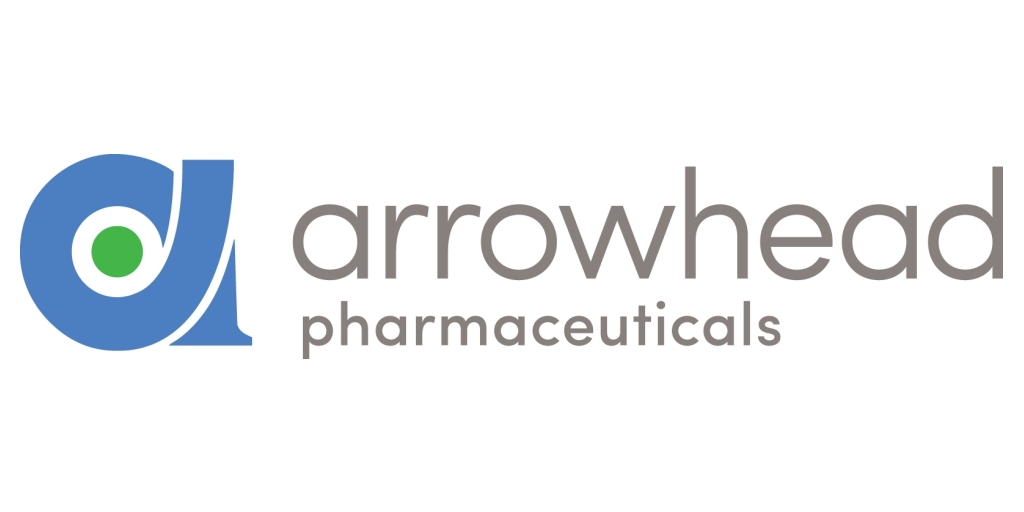- The New Drug Application is based on positive results from the Phase 3 PALISADE study
- People living with familial chylomicronemia syndrome have extremely high triglyceride levels and a substantially higher risk of developing acute pancreatitis and associated long-term complications, including poor quality of life
- There are currently no FDA approved therapies to treat familial chylomicronemia syndrome
PASADENA, Calif.--(BUSINESS WIRE)--$arwr--Arrowhead Pharmaceuticals, Inc. (NASDAQ: ARWR) today announced that it submitted a New Drug Application (NDA) to the U.S. Food and Drug Administration (FDA) for investigational plozasiran for the treatment of familial chylomicronemia syndrome (FCS), a severe and rare genetic disease which currently has no FDA approved treatments. Arrowhead also intends to submit applications for approval of investigational plozasiran for the treatment of patients with FCS to additional regulatory authorities in 2025.


“The NDA submission for investigational plozasiran represents an important milestone for Arrowhead as we advance multiple potential new medicines developed using our proprietary Targeted RNAi Molecule (TRiMTM) platform for patients in diverse therapeutic areas including cardiometabolic, pulmonary, neuromuscular, and liver diseases,” said Chris Anzalone, Ph.D., President and CEO at Arrowhead. “We believe in the potential of RNAi to make a meaningful impact on patients and this first NDA submission is the culmination of over 15 years of innovation and commitment by so many talented Arrowhead employees and the investigators, patients, and caregivers that helped make our vision a reality.”
Bruce Given, M.D., chief medical scientist at Arrowhead, added, “The SUMMIT program of clinical studies of plozasiran has achieved promising and consistent results in various patient populations representing multiple points on the spectrum of elevated triglycerides. FCS represents the most severe end of the spectrum in which many patients have a very poor quality of life and are at high risk of developing acute pancreatitis, which can be life threatening. There are currently no approved therapies in the U.S. to treat FCS, so we are working tirelessly to get plozasiran to patients as quickly as possible, pending FDA review and approval.”
The NDA submission is supported by the SUMMIT program of clinical studies of plozasiran and positive findings in the Phase 3 PALISADE study. PALISADE successfully met its primary endpoint and all multiplicity-controlled key secondary endpoints, including statistically significant reductions in triglycerides (TGs), apolipoprotein C-III (APOC3), and the incidence of acute pancreatitis (AP).
In PALISADE, plozasiran achieved deep and durable reductions in triglycerides with a median change from baseline of 80% in the plozasiran 25 mg group and a statistically significant 83% reduction in the risk of developing acute pancreatitis compared to placebo in the pooled plozasiran 25 mg and 50 mg group. Overall, plozasiran has been generally well-tolerated to date. In the PALISADE study, the most frequently reported treatment emergent adverse events for the 25 mg dose that is proposed for marketing approval were abdominal pain, COVID-19, nasopharyngitis, and nausea.
The efficacy and safety results from the PALISADE study were presented at the American Heart Association Scientific Sessions 2024 (AHA24) and simultaneously published in Circulation and presented at the European Society of Cardiology (ESC) Congress 2024 and simultaneously published in The New England Journal of Medicine. AHA24, ESC, and other plozasiran presentations may be accessed on the Events and Presentations page in the Investors section of the Arrowhead website.
About Familial Chylomicronemia Syndrome
Familial chylomicronemia syndrome (FCS) is a severe and rare disease often caused by various monogenic mutations. FCS leads to extremely high triglyceride (TG) levels, typically over 880 mg/dL. Such severe elevations can lead to various serious signs and symptoms including acute and potentially fatal pancreatitis, chronic abdominal pain, diabetes, hepatic steatosis, and cognitive issues. Currently, there are no therapeutic options that can adequately treat FCS in the US.
About Plozasiran
Plozasiran, previously called ARO-APOC3, is a first-in-class investigational RNA interference (RNAi) therapeutic designed to reduce production of apolipoprotein C-III (APOC3) which is a component of triglyceride rich lipoproteins (TRLs) and a key regulator of triglyceride metabolism. APOC3 increases triglyceride levels in the blood by inhibiting breakdown of TRLs by lipoprotein lipase and uptake of TRL remnants by hepatic receptors in the liver. The goal of treatment with plozasiran is to reduce the level of APOC3, thereby reducing triglycerides and restoring lipids to more normal levels.
In multiple clinical studies, investigational plozasiran has demonstrated reductions in triglycerides and multiple atherogenic lipoproteins in patients with familial chylomicronemia syndrome (FCS), severe hypertriglyceridemia (SHTG), and mixed hyperlipidemia. Plozasiran has been generally well tolerated to date with treatment emergent adverse events reported that generally reflect the comorbidities and underlying conditions of the study populations. Across clinical studies and study populations, the most frequently reported treatment emergent adverse events for the 25 mg dose that is proposed for marketing approval were COVID-19, upper respiratory tract infection, headache, Type 2 diabetes mellitus, and abdominal pain.
Plozasiran is being investigated in the SUMMIT program of clinical studies, including the PALISADE Phase 3 study in patients with FCS, the SHASTA studies in patients with SHTG, and the MUIR and CAPITAN studies in patients with mixed hyperlipidemia.
Plozasiran in the treatment of patients with FCS has been granted Breakthrough Therapy Designation, Orphan Drug Designation, and Fast Track Designation by the U.S. Food and Drug Administration and Orphan Drug Designation by the European Medicines Agency. Investigational plozasiran has not been reviewed or approved to treat any disease.
About PALISADE Phase 3 Study
The PALISADE study (NCT05089084) is a Phase 3 placebo controlled study to evaluate the efficacy and safety of plozasiran in adults with genetically confirmed or clinically diagnosed FCS. The primary endpoint of the study is percent change from baseline in fasting TG versus placebo at Month 10. A total of 75 subjects distributed across 39 different sites in 18 countries were randomized to receive 25 mg plozasiran, 50 mg plozasiran, or matching placebo once every three months. Participants who completed the randomized period were eligible to continue in a 2-part extension period, where all participants receive plozasiran.
About Plozasiran EAP
Arrowhead is committed to bringing new investigational medicines to patients with serious diseases as quickly and efficiently as possible. The company has established an expanded access program (EAP) for some individuals living with FCS. As with any investigational medicine that has not been approved by regulatory authorities, investigational plozasiran may or may not be effective in treating your diagnosis or condition, and there may be risks associated with its use. If you are a patient or caregiver wishing to know more about this plozasiran EAP for FCS, please discuss this EAP and all treatment options with your treating physician. If you are a treating physician and are seeking information about the plozasiran EAP or would like to request access for a patient, please contact EAP@arrowheadpharma.com.
About Arrowhead Pharmaceuticals
Arrowhead Pharmaceuticals develops medicines that treat intractable diseases by silencing the genes that cause them. Using a broad portfolio of RNA chemistries and efficient modes of delivery, Arrowhead therapies trigger the RNA interference mechanism to induce rapid, deep, and durable knockdown of target genes. RNA interference, or RNAi, is a mechanism present in living cells that inhibits the expression of a specific gene, thereby affecting the production of a specific protein. Arrowhead’s RNAi-based therapeutics leverage this natural pathway of gene silencing.
For more information, please visit www.arrowheadpharma.com, or follow us on X (formerly Twitter) at @ArrowheadPharma, LinkedIn, Facebook, and Instagram. To be added to the Company's email list and receive news directly, please visit http://ir.arrowheadpharma.com/email-alerts.
Safe Harbor Statement under the Private Securities Litigation Reform Act:
This news release contains forward-looking statements within the meaning of the "safe harbor" provisions of the Private Securities Litigation Reform Act of 1995. Any statements contained in this release except for historical information may be deemed to be forward-looking statements. Without limiting the generality of the foregoing, words such as “may,” “will,” “expect,” “believe,” “anticipate,” “hope,” “intend,” “plan,” “project,” “could,” “estimate,” “continue,” “target,” “forecast” or “continue” or the negative of these words or other variations thereof or comparable terminology are intended to identify such forward-looking statements. In addition, any statements that refer to projections of our future financial performance, trends in our business, expectations for our product pipeline or product candidates, including anticipated regulatory submissions and clinical program results, prospects or benefits of our collaborations with other companies, or other characterizations of future events or circumstances are forward-looking statements. These forward-looking statements include, but are not limited to, statements about the initiation, timing, progress and results of our preclinical studies and clinical trials, and our research and development programs; our expectations regarding the potential benefits of the partnership, licensing and/or collaboration arrangements and other strategic arrangements and transactions we have entered into or may enter into in the future; our beliefs and expectations regarding milestone, royalty or other payments that could be due to or from third parties under existing agreements; and our estimates regarding future revenues, research and development expenses, capital requirements and payments to third parties. These statements are based upon our current expectations and speak only as of the date hereof. Our actual results may differ materially and adversely from those expressed in any forward-looking statements as a result of numerous factors and uncertainties, including the impact of the ongoing COVID-19 pandemic on our business, the safety and efficacy of our product candidates, decisions of regulatory authorities and the timing thereof, the duration and impact of regulatory delays in our clinical programs, our ability to finance our operations, the likelihood and timing of the receipt of future milestone and licensing fees, the future success of our scientific studies, our ability to successfully develop and commercialize drug candidates, the timing for starting and completing clinical trials, rapid technological change in our markets, the enforcement of our intellectual property rights, and the other risks and uncertainties described in our most recent Annual Report on Form 10-K, subsequent Quarterly Reports on Form 10-Q and other documents filed with the Securities and Exchange Commission from time to time. We assume no obligation to update or revise forward-looking statements to reflect new events or circumstances.
Source: Arrowhead Pharmaceuticals, Inc.
Contacts
Arrowhead Pharmaceuticals, Inc.
Vince Anzalone, CFA
626-304-3400
ir@arrowheadpharma.com
Investors:
LifeSci Advisors, LLC
Brian Ritchie
212-915-2578
britchie@lifesciadvisors.com
Media:
LifeSci Communications, LLC
Kendy Guarinoni, Ph.D.
724-910-9389
kguarinoni@lifescicomms.com




